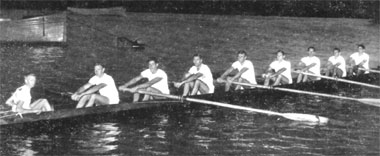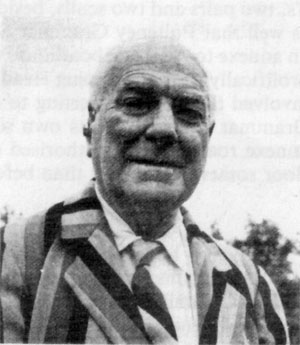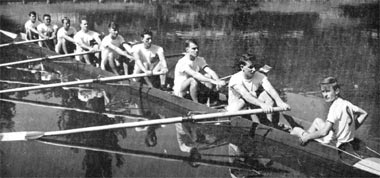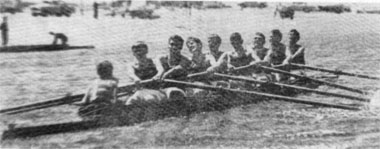Adelaide Rowing Club - The First Hundred Years
A Narrative History 1882-1982 - Compiled by R W Richardson
Table of Contents
Chapters
- Introduction
- I Zingari: The Origin of the Club
- Narrative History of ARC: 1882-1887
- 1887-1892
- 1892-1897
- 1897-1902
- 1902-1907
- 1907-1912
- 1912-1922
- 1922-1927
- 1927-1932
- 1932-1937
- 1937-1942
- 1942-1947
- 1947-1952
- 1952-1957
- 1957-1962
- 1962-1967
- 1967-1972
- 1972-1977
- 1977-1982
- Early Days of Rowing on the Murray
- Memoirs of my Association with the ARC and Rowing Men
- ARC's Famous Coxswains Over the Years
- Get Fit for Autumn—How to do it
- Notable ARC Coaches
- ARC at War
- Pity the Poor Hon. Secretary!
Appendices
17. Narrative History of the Adelaide Rowing Club - 1957-1962
Season 1957-58
After such a successful season, it might be expected that the usual letdown would occur. But, surprisingly, the Club won 24 races this season (two more than last season), including Champion Junior 8's and the Arnold Cup again, this time with a crew consisting of two pairs of brothers, all of whom were to become very prominent in Club affairs and successful as rowers - the Sarah brothers, Don and Neil, and the Humble brothers, Sam and Peter, steered by Paris Osborne, who was awarded the Ken Milne Trophy for his efforts again, having steered 10 winning crews.
It was a very gay and busy season, under the Captaincy of Jim Harvey, a born organiser and full of enthusiasm, and it was unlucky that Torrens Rowing Club just pipped Adelaides by three points for the State Premiership.
By now the Club Senior 8 had some first class oarsmen in Roger Luke, David Wurm, Sam Humble, Murray Rossiter, Ian Jamieson, Don Sarah, Doug Wiles and Tom McCormick, but it proved difficult to keep the same good combination together throughout the season. One more win would have clinched the State Premiership for the second season in succession.
Some very promising Juniors were coming along, and the Club was fortunate in the quality and enthusiasm of its coaches, one of whom, Brick Pennington, was chosen to coach the King's Cup crew. Joe Boulton, Malcolm Forgan and Sam Rose all gave a lot of help, and got results in every regatta but one.
Neil Sarah, Don's younger brother, was awarded the Captain's Trophy, Brian Sawley got the J.J. Sharp and Brian Dalton rowed in 19 winning crews to win the C.A.M. West shield.
Besides the coach, A.R.C. had two men in the King's Cup 8 plus two emergencies - Sam Humble at bow, Ian Jamieson at 3, plus Roger Luke and Doug Wiles.

1958 SA Crew
Other activities were certainly not neglected, 226 people attending the Burnside Town Hall for the Ball, and good numbers turned up for the Cabaret, when seven entries were judged in the Miss Adelaide quest for entry in the Miss Henley competition at Henley on Torrens. The Christmas Cocktail Party and the Annual Dinner also went with a swing.
Once again John Williams lent his house and garden for a Fun and Games night to raise money for the King's Cup crew, the three Miss Henley nominees being the star attractions.
By now the annual football match and tug-of-war against Port Adelaide Club had become a fixture, with a Shield presented by John Sheppard for the winner of the football, and the Murch and Simmonds Cup for the tug-of-war, held at Williamstown Oval on a Sunday. The Morelli Cup was another fixture, contested between old oarsmen of three metropolitan clubs, and resulted in a dead heat between Torrens and Adelaide Rowing Clubs.
On top of all this, organised by Don Sarah and Bob Richardson, members carried out some structural repairs to the centre piers to the clubhouse, and installed a concrete floor over the entire ground area, formerly an earth floor covered with tan bark and the source of all the termite troubles over the years.
Such activity in one season was the surest sign of a healthy Club.
Season 1958-59
The previous two seasons' successes and enthusiasm began to wane, with only eleven wins registered at regattas. Nearly all of last season's Senior 8 were not available, so that, apart from a Senior Pairs win on the Torrens, no races other than Maidens were won until February, and after that nearly all of the rowers were last season's maidens and juniors, with two surviving seniors.
The coaches were still there in numbers unheard of in seasons gone by or still to come, but the major drive of the members was seen to be concentrated in the S.A. Rowing Association. Practically every office in the senior echelon was filled by A.R.C. members, including President, Chairman, Secretary, Treasurer and the Regatta Committee. Keith Forwood was also President of the S.A. branch of the Australian Olympic Games Federation.
With the Club fostering new schools taking on rowing for the first time, other mature members were coaching crews from Pulteney Grammar School, Kings College, Unley High School and Goodwood Boys' Technical School. Suddenly the Club had become a host of coaches and administrators. There were sixteen members named as coaches and thirteen named as officials of the S.A.R.A.
If that sounds terribly stuffy, let it be said that the Rowing Association came up with one of the most risque and bizarre schemes to promote Henley-on-Torrens that has ever been tried before or since. They paid the British showbiz gal, Sabrina, renowned for her outstandingly developed bust, to act as help with the judging of the Ideal Henley Girl of 1959. When Sabrina sat down, she was besieged by males asking her questions and breathing down that magnificent cleavage.
Adelaide Rowing Club was the natural place to ask the lady to come and meet her ardent admirers, and everybody enjoyed the occasion, including Sabrina and the Boathouse Committee, with their ticket sales linked to the cellarette. Incidentally, Sabrina judged Miss Kay McKenzie, one of the A.R.C. nominees, as the Ideal Henley Girl.
Another sporting contest was added to the winter programme, in the form of an annual Golf Match, on top of all the other functions formerly held. One of the Club Fours had another try at Henley-on-Yarra without success, a new eight was delivered and named I Zingari X, and a new regulation 4 was ordered with a view to phasing out the old tubs. Henceforth all novices, maidens and juniors would row in regulation 4's.
Brian Dalton continued his pot-hunting success with another win in the C.A.M. West Shield (his third in succession), while the Captain's Trophy went to John Jarvis, shortly to rise to be Captain himself.
Whether Sabrina, when she went back to England, whispered in the Queen's ear is not known for certain, but three Adelaide Rowing Club members received honours this season - Sir Collier Cudmore, Sir Tom Barr Smith and Claude Coogan, O.B.E.

Claude Coogan OBE
Club President 1960-62
Season 1959-60
The senior oarsmen continued to gurgle down the drain. Not one of the 8 races won this season was in the senior category, and only 3 were in the junior, and two of them were at Berri and Renmark.
Two members of the Club, Tom McCormick and Geoff Burfield, rowed in the King's Cup 8 at Launceston, the last King's Cup to be rowed over three miles. Next year's King's Cup would be rowed at Port Adelaide over 2,000 metres. This year Ian Jamieson was one of the selectors, and a new aid in the form of the Torrens R.C. ergometer was used for the first time in determining the best men.

1960 SA Crew
The new regulation 4 was named Derwent IV by Lady Cudmore on Opening Day. The attendance was disappointing, and continued to be at other social functions throughout the season. The Ball had attracted only sixty, and was a loss; the Cabaret and Christmas party were both losses, and although the Annual Dinner made a small profit, only 70 members came along. The only function to make a healthy contribution to the coffers was the `Festival of Fun' held at the home of Mr. and Mrs. Peter Siekmann on the evening of the Metropolitan Regatta, when 700 people turned up.
But that was not the only spectacular event; for the first time, two Club rowing events were held under lights - Blain 4's and I Zingari Challenge 4's, when on two separate nights ten crews contested these races with the co-operation of the Festival of Arts Committee.
Adelaide Rowing Club continued to dominate the S.A.R.A. ranks, with R. Horton Wallman, the President, off to the U.S.A. as the Australian Olympic Federation representative at the Winter Olympics at Squaw Valley, and Keith Forwood elected President of the Australian Amateur Rowing Council.
On a more mundane level, the Vice-Captain, Don Sarah, almost unaided, put in a master key locking system on the external doors and organised the enlargement of the caretaker's quarters and the installation of a sink and water heater.
Season 1960-61
The new season brought a new management with an older member in Colin Runge as Captain, John (Chop) Osborne as Vice, and Peter Kruse as Secretary, all determined to stir things up. This they managed to do with a great deal of enthusiasm and drive, and finished with 17 wins and the Junior Premiership. To do this the Club won eight Junior 8's, including Champion Junior 8's, but not one Senior event. Doug Linnett was made Chairman of coaches including Norton Ladkin, Brian Dalton and eight other older members, and Eric Worley was made Chairman of coxswains, Eric's son Peter being one of the Club's most promising coxswains.

Champion Lightweight 8's, 1961
G. Perry, cox, R.F. Ingham, str., G. Hill, 7, P. Osborne, 6, J. Inghan:, S, R. Langman, 4, J. McLachlan, 3, N. Sarah, 2, C. Sparrow, bow.
One of the young lions in the new crop of oarsmen was David Bishop, who was automatic choice for the J.J. Sharp Trophy, and got a seat in the King's Cup crew, along with John Brook and Geoff Burfield. Richard Morgan was chosen in the State Lightweight 4, and Peter Worley coxed it, and incidentally was awarded the Ken Milne Trophy by the Club.
With the South Australian Rowing Association stacked tight with Adelaide members and host to the other five States for the King's Cup, and Dick Clark Chairman of the King's Cup Committee, Adelaide Rowing Club members featured in all the working, judging, accommodation and entertainment sub-committees. Luckily the weather at Port Adelaide on the day of the contest, over 2,000 metres for the first time, was fine, and South Australia managed to come fourth, ahead of two other crews in the big race, a real improvement over the previous few years.
Meanwhile, back at the Club, things were just as busy. Working bees jacked up the ablutions block on the upper floor and built a new brick women's toilet block and office under it, and concreted the "hard" for boat launching in front of the boathouse.
The Committee took the first step in applying for a liquor licence by becoming an Incorporated Club, and early moves were made with the S.A. Harbours Board towards being allocated a site for a Rowing Centre on the shore of the "tidal basin". They also purchased a new Gladstone skiff and had a boat trailer made, to the design of John Osborne, at a cost of £220.
Not only did they run Metropolitan Regatta with a record number of 71 events, requiring races to be run at three minute intervals, but agreed to run Henley-on-Torrens for the S.A.R.A. (who were being run by the same firm anyway). Henley, unfortunately, had progressively been suffering from being dished up year after year to the same old formula, and support had fallen off, so that a loss was again incurred on the day. Hard working Rod Leaver and his gang could not be blamed for that, nor could the A.R.C. entrant for the Ideal Henley Girl, Miss Tina O'Brien.
Notwithstanding all this action, the bank balance broke almost even at the season's end, and John McLachlan had done wonders with maintaining the fleet; and one of the schools the Club had sponsored, Pulteney Grammar, won the Head of the River.
Two men connected with the Club died - caretaker Malcolm McColl and old member Freddie Gale, who was the first rowing master of the first schoolboy rowers actively sponsored by Adelaides - Scotch College.
Season 1961-62
The momentum of last season was not only maintained, but increased under Colin Runge's captaincy, and the Club won 24 races, being narrowly beaten into second place in both Senior and Lightweight Pennants by Torrens Rowing Club.
A new tandem-rigged Sargent and Burton 8 was ordered, paid for and delivered between 23rd January 1962 and 9th February 1962, through a decision of the N.S.W. Rowing Association to defer their original order, which was hastily taken up in person by Doug Jarvis, John's father, who flew to Sydney to accomplish this in the nick of time, as N.S.W. decided, too late, that they wanted the eight after all. Doug formed a committee of three keen sportsmen, the other two being Bart Bishop (David's father) and Claude Coogan, the Club President and a former Tasmanian King's Cup stroke, who showed how to go about raising funds among their business friends, and in no time had the funds to meet the bill.
The drawcard was the immediate loan of the boat to the S.A. King's Cup crew, with John Jarvis and David Bishop rowing at 7 and 5, and coached by John Hill, with Tom McCormick as spare man; so rowing men of means from other clubs and firms helped to fill the coffers.
Two men in the lightweight crew were also from Adelaide Rowing Club - Bruce Pontifex at bow, and Peter Worley as cox.
Adelaides won Champion Lightweight 8's, six Senior 8's and, if Champion Senior 8's had been held later in the season, they would have romped home with the State Premiership, as that 8 improved out of sight under John Hill's coaching, after being beaten in Champion 8's.
How We Got A Liquor Licence
But rowing was only part of the story this season. In his struggle to achieve a liquor licence, Captain Runge had masterminded the collection of signatures from local residents, many of whom were migrant shopkeepers and older dwellers in the city side streets, and many of whom did not seem to realise they were signing a local option poll assenting to Adelaide Rowing Club's being granted a liquor licence. He organised members repairing and helping with the enclosure of the balcony to form a bar room and all the required gear for serving beer, and before long Geaff Harry, the Club's honorary solicitor, was standing before His Honour Mr. Johnston, S.M., submitting a case for the granting of a licence. It was no push-over, either, but it was finally granted before many of the older members of the Club realised what was afoot. Claude Coogan blamed his hearing aid for his not realising that a new era had opened up during his Presidency.
But a new source of income separate from subscriptions and time-consuming social functions had to be found to keep the Club's finances up to the needs of the rowing side. Compared with competition before the war, clubs were rowing two and three times the number of races in more categories in more regattas. Selling liquor to the Public attending regattas and functions held in the boathouse would do this, if handled efficiently; and therein lay the challenge. A conscientious bar manager with experience could make a good profit, otherwise the enterprise could be a burden. The Club had been fortunate in the way its friends had raised funds for the new 8, and Jock Jamieson had raised £950 towards the new bar room, but there was a limit to the "bite" which could be put on the members.
Once again an active Ladies' Committee came to the rescue, and the "Festival of Fun" was a great success at Colin Runge's home. Mrs. Joe Vardon donated a new Club flag, the second she had made, and a successful '78th anniversary party' was held at the home of Mr. and Mrs. N.C. Binder.
The Christmas Cabaret and the Williamstown picnic football match and tug-of-war were both well attended, so it could be said that the "Runge era" had been full of action. Next season, Colin stepped down.
